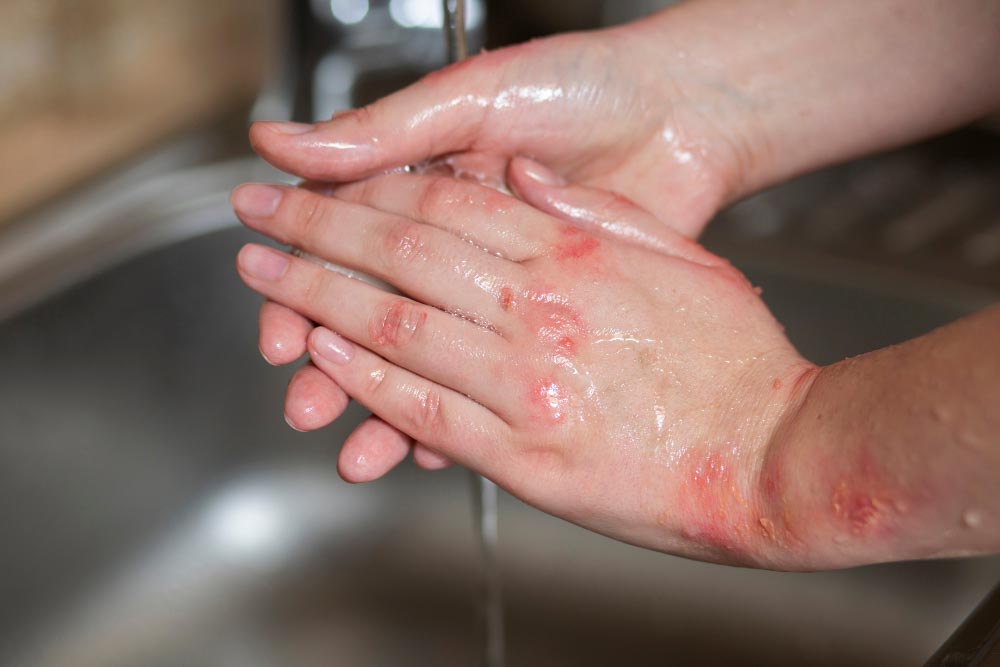Eczema, scientifically known as atopic dermatitis, is a skin condition that causes redness and itchiness to your skin.’
The word atopic (atopy) signifies that your immune system is problematic, while dermatitis is a generic medical term denoting a common skin irritation or inflammation of the skin. Basically, atopic dermatitis (eczema) means skin irritation/inflammation caused by a problematic immune system.
A report from the MedicalNewsToday revealed that in the United States, different types of eczema have already affected around 31.6 million people (around 10% of the population). It is also said to be prevalent in children, but it can affect anyone regardless of age.
Sadly, there is still no cure for atopic dermatitis. But there are several self-care methods and treatments that may alleviate the inflammation, itchiness, or flare of symptoms caused by eczema.
Here are some helpful tips to make your eczema go away:
1. Topical Medications
Topical treatments are medications that are applied to a specific part of the body, such as the skin or mucous membrane, to limit the symptoms and relieve inflammation. For eczema, topical treatments may include:
- Calcineurin inhibitors
- JAK (Janus kinase) inhibitors
- PDE4 inhibitors
- Prescription steroids
2. Oral Medications
Oral medications are often prescribed by allergists when dermatitis or eczema are not relieved by topical medication (creams and ointments). Oral medications and antibiotics are given in a short period to contain and control severe symptoms. These include:
- Oral immunosuppressants
- Oral corticosteroids
- Oral antibiotics
3. Antibiotics
In instances of infected eczema covering an extensive area of the skin, a doctor may prescribe you to take antibiotics. The most common antibiotic that allergists prescribe is flucloxacillin. Other alternative antibiotics would be:
a. Clarithromycin
b. penicillin,
c. fusidic acid (topical antibiotic)
4. Antihistamine
Scratching itchy skin due to eczema might only worsen your condition. Triggers like pollen or dust might cause the release of histamine as a response of your immune system to combat infection. Thus, certain antihistamines like these would come in handy:
First generation antihistamines (sedation, drowsiness):
- Benadryl (diphenhydramine)
- Chlor-Trimeton (chlorpheniramine)
Second generation antihistamines
- Claritin (loratadine)
- Zyrtec (cetirizine)
5. Use Moisturizers
When it comes to alleviating the itchy sensation of eczema, moisturizers are a friend in need. According to Dr. Corey L. Hartman, founder of Skin Wellness Dermatology in Birmingham, hypoallergenic and hydration products can soothe the irritations brought on by eczema.
Here are some moisturizing creams that dermatologists strongly suggest:
- Aquaphor Healing Ointment
- Aveeno Eczema Therapy Itch Relief Balm
- Aveeno 1% Hydrocortisone Anti-Itch Relief Cream
- Cerave Moisturizing Cream
- Cerave Healing Ointment
- Cetaphil Baby Eczema Soothing Lotion with Colloidal Oatmeal
- First Aid Beauty Ultra Repair Face Moisturizer
- La Roche-Posay Lipikar Soothing Relief Eczema Cream With Colloidal Oatmeal
- Neutrogena Norwegian
- Formula Hand Cream
- Vanicream Moisturizing Cream
6. Shun Stimulants or Triggers
There are several environmental factors that could trigger eczema. Identifying and avoiding your irritants such as allergens, stress, food, obesity, sweat, and exposure to hot or cold temperatures may lessen your skin reaction. For infants or children that are experiencing food flares, it may be best to go to an allergist in order to identify possible food allergies.
7. Phototherapy
Also known as heliotherapy or light therapy, phototherapy involves a treatment wherein natural or artificial light is utilized to improve a health condition such as psoriasis, eczema, vitiligo, and itchy skin. This medical treatment may use one of the following:
a. Light emitting diodes (LEDs)
b. Sunlight
c. Fluorescent light bulbs
d. Halogen lights
Exposure to light would decelerate the growth of skin cells and inflammation. Thus, people suffering from eczema are exposed to varying wavelengths of UV (ultraviolet) light to reduce itchiness and inflammation.
8. Mild or gentle soaps
Skin care plays a vital role for those suffering from atopic dermatitis. Moreover, some soaps that contain harsh chemicals and allergens will only worsen their condition. Chemicals like sodium lauryl sulfate may cause dryness and irritation because it removes the natural oil from your skin.
Dermatologists have suggested that it is best to use non-soap cleansers since they usually do not contain sodium lauryl sulfate. Examples of non-soap cleansers that you may use are:
a. Aquaphor Gentle Wash
b. AVEENO
c. Basis Sensitive Skin Bar
d. CeraVe Hydrating Cleanser
e. Cetaphil Gentle Cleansing Bar
f. Dove Sensitive Skin Unscented Beauty Bar
9. Lukewarm water when bathing
A lot of articles online has suggested using hot water when bathing to provide relief for eczema. Although hot water may provide short-term relief, it is not advisable for treating eczema. In contrast, dermatologists have opted for lukewarm water since very hot water can worsen eczema by drying out your skin and removing its natural oil.
If you know someone diagnosed with eczema, do not hesitate to share these tips!
Advise them to seek professional aid as soon as possible since there are several other ways to treat atopic dermatitis. Joining eczema clinical trials can also be a great way to find possible cures for the disease, so don’t hesitate to participate if you have an opportunity.

